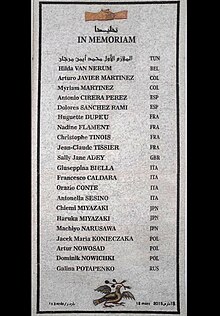Bardo National Museum attack
[14] However, the Tunisian government blamed a local splinter group of al-Qaeda in the Islamic Maghreb, called the Okba Ibn Nafaa Brigade, for the attack.
[5] Since the removal from power of longtime President Zine El Abidine Ben Ali in the 2011 Tunisian Revolution, the country has faced occasional attacks from Islamist militants, mainly in remote areas.
[17] The attack began at around 12:30 p.m.[2] At that time, security guards protecting the museum and the nearby Parliament building were absent on a coffee break.
[5][22] Tunisian security forces escorted dozens of tourists up nearby steps and away from the danger, as armed agents pointed guns toward an adjacent building.
[25] According to analyst Rita Katz of the SITE Intelligence Group, holders of Twitter accounts associated with ISIL were overjoyed at the attack, urging Tunisians to "follow their brothers".
[14] Meanwhile, a Twitter account linked to the Islamic State published a photograph of one of the Italian victims; the image, showing Francesco Caldara, has a red cross drawn on it and the words: "Crusader Crushed.
[citation needed] According to BBC security correspondent Frank Gardner, an al-Qaeda operative claimed the men had spent two months training with militants in Derna, Libya.
[51] On 20 March, Tunisian Security Minister Rafik Chelly announced that Labidi and Khachnaoui had received weapons training in Libya from an unspecified group prior to carrying out the attack.
[49] On 28 March, Tunisian police killed Lokman Abu Sakhra, an Algerian suspected of planning the attack, along with eight other armed men during a raid in the southern Gafsa region.
[63] Prime Minister Habib Essid issued a statement on the "cowardly" attack and called for unity,[25] later chairing an emergency cabinet meeting.
[24] Essebsi also praised Akil, a one-and-a-half-year-old German Shepherd police dog who was killed in the raid, saying, "It's a victim we don't talk about but it's a heavy loss.
"[64] On the day following the attack, Essebsi ordered the deployment of Tunisian troops to the country's major cities as a security precaution.
[43] British Foreign Secretary Philip Hammond described the killings as a "cowardly terrorist attack", whilst Prime Minister David Cameron described the incident as "appalling and brutal".
[78] On 4 March 2019, a memorial to the British victim and those of the 2015 Sousse attacks, called Infinite Wave, was unveiled in Cannon Hill Park, Birmingham, England, by Prince Harry, Duke of Sussex.


